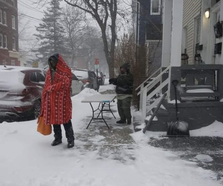 This is both blunt and transparent . . . Luke 18:22, a verse in this Sunday's Sermon text . . . “When Jesus heard this, he said to him, ‘One thing you still lack. Sell all that you have and distribute to the poor, and you will have treasure in heaven; and come, follow me.’” In a few seconds, after the rich ruler walks away “sadly,” Jesus then says: “How difficult it is for those who have wealth to enter the kingdom of God! For it is easier for a camel to go through the eye of a needle than for a rich person to enter the kingdom of God.” There is no doubt this is to be applied rather broadly and not to be rationalize, “Well, this was to one person and God doesn't call every rich person to do this,” for the disciples understood it to apply to all rich people, “then who can be saved then?” Those who typically have the authority to interpret texts like this one are from among those with elevated status in the social structures, i.e., those who rule and have wealth—you can see the conflict of interest here. I do. I feel that conflict myself. I am not exempt from “spiritualizing” or looking for exemptions for this text. We all scramble to exempt ourselves, somehow, from this--no matter the size of our paycheck and bank accounts. Me, too. I have always been rather plagued by this text. But after 40+ years of following Jesus (and this is a “follow Me” text, cf. 18:22d), I wonder if we are so attached to this world—as the Rich Mullins song says, the stuff of earth competes for our allegiance—that we are not free to actually follow Jesus in the way the Gospels teach us? I confess, this week’s sermon text rattles me. And more so because it’s a feast week! Thanksgiving. And it’s cold out. There are homeless surrounding me. And I live amid scarcity.
0 Comments
IV. Our Church Life should be an Invitation to Come to Jesus, take His Yoke, and You will Find Rest: We are to embody the invitation to Come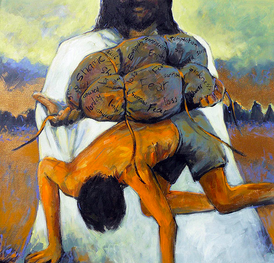 Our little Hill church puts itself into the heart of the community: at the Hill North Community Management Team, the Free Sidewalk Breakfast each Saturday, our Summer Park BBQ ministry; showing up to almost every community event, and my pastoral street counseling right out my front door. When John the Baptist was facing the end of his ministry (in Matthew 11), he told his own disciples to go ask Jesus if he was the One or should they look for another (was this for John or his disciples, I have my opinion on that, but it is surely for the church). How do they know Jesus is the One and there is none other to look for? Jesus asks them what they see (which implies action, demonstration, something happening): How do they know? ➥ the blind receive sight ➥ the lame walk ➥ lepers are cleansed ➥ the deaf hear ➥ the dead are raised up ➥ the poor have the gospel preached to them (Matthew 11:4-6) This is exactly what Jesus has been doing as his disciples followed him around. No doubt this is Matthew’s version of Luke’s draw on Isaiah 61, which promises that God’s Spirit would be on the Messiah to preach the gospel to the poor, to heal, to free and bring justice (Isaiah 61:1). This is the context in Matthew. This is exactly what Jesus is doing. This is what the temple and synagogue leadership miss, ignore, or are fighting against.They are still bothered for in Matthew 11:19 there is more accusation: . . . they say, ‘Look at him! A glutton and a drunkard, a friend of tax collectors and sinners!’ We end our thread in Matthew 11 where Jesus invites all who labor and are heavy laden to come. First, Jesus praises the Father that “all things have been handed over” to Him “and no one knows the Son except the Father, and no one knows the Father except the Son and anyone to whom the Son chooses to reveal him.” As Presbyterians, we identify with this divine election. Yet we forget that the means of grace to call the elect is given at the same time: 28Come to me, all who labor and are heavy laden, and I will give you rest. 29Take my yoke upon you, and learn from me, for I am gentle and lowly in heart, and you will find rest for your souls. 30 For my yoke is easy, and my burden is light.” Recently during a Hill Sunday sermon on Matthew 11, I asked my own congregation: “How do you think the young church, with nothing much to offer, no social or political power, possessing little resources—and life didn’t really get easier and better for early believers. They risked everything, and for most, life got harder. In the first 150 years after Pentecost, how did Christianity became the largest religious sect in and around the Roman Empire? How? They accepted all into their fellowship, this changed their households . . . street by street, village by village, table by table. It all changed where gathered-churches lived out “Come all who labor and are heavy laden.” The body of Christ, the local church, with Jesus our Head, ruling and reigning at the Father’s right hand, is His presence in the community, in the Hill community, in your community right here in Concord. We show them Jesus by who we are and what we do so that all who struggle and toil and are carrying burdens no one should carry alone (because they see) hear the invitation to Come to Jesus and take on His yoke and find rest. We are to embody the invitation to Come. We need to be refreshed in the gospel every time we gather because we need the power of the gospel in order to be the gospel in action. I might get everything else wrong about church planting . . . I might not even be very good at it, at least not good at what is expected . . . but one thing I will get right, by God’s grace, to help the CPC in The Hill flock understand and know what it means to follow Jesus around . . . Our church does this . . . even though we are a church in an under-resourced community, we spend ourselves on our community, attempting to associate with the lowly, the hurt, those who's lives are messing, unclean, spoiled, and forgotten. A church needs to be where crowds are (out in the ebb and flow of community life): this is why our small under-resourced church spends its time in the community, places where crowds show up. This is what it means to follow Jesus around and it is how others know that the kingdom of heaven has appeared. *This sermon was preached at Redeemer Presbyterian Church in Concord, MA on Sunday, May 19, 2019. The full sermon maybe downloaded as a PDF (here). An audio version is also be available >> Audio version Part I | Part II | Part III | Part IV
III. We demonstrate the presence of the Kingdom by sending Laborers into God’s Field to do what Jesus did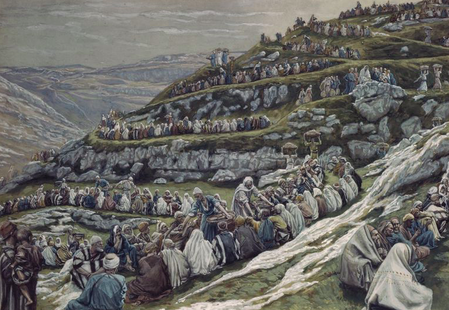 We have moved into the Hill. We relocated. (You all made this possible—thank you.) This is important: most pastors of churches in places like the Hill don’t live in the church’s neighborhood. Our moving into the Hill is a big deal—that’s what our neighbors tell, too. This is huge because there is a connection between the gospel and the community . . . between Shepherds and the community . . . between churches and the community. No wonder Jesus calls for laborers for the harvest. Another summary at the end of Matthew 9.
The reason for Jesus’ compassion is that they were sheep without a shepherd, harassed and dispirited. Jesus mixes his metaphors and says that there is a need for Shepherds for the Harvest is rip. “Harvest” is a great eschatological, end time word used throughout the Old Testament. “Harvest” means we are in the age of the appearance of the Kingdom of Heaven, but it also suggests that the end is near (of course eschatologically near, but also timely, the time to harvest is now; this gives us an urgent frame for the task). We should not be surprised that there is a relationship between this crowd of outsiders, unclean, lame, diseased, their condition (harassed and dispirited), and the absence of a Shepherd. People die without a shepherd. This is why we pray to the Lord of the Harvest to send forth laborers, send Shepherds into the field. I am humbled by how I am greeted on our apartment’s street: “Pastor.” “Rev.” “Park Pastor.” My favorite is “Hey, Preach.” But the one that honors me the most is when my neighbors call me, “Pastor of the Hill.” That’s crazy, right? I had just walked out of our apartment front door, heading to my car for a meeting, when I heard, “Pastor, come here.” This happens often. I do not carry cash on me. This is an important rule ministering where I pastor. Usually it is, “Do you have a dollar?” or “I need $8.50 for a bus ticket.” It’s hard, but I need to say, “No, I don’t.” Yet, I am a neighbor. And, a pastor (which most of our neighbors know) . . . so, sometimes I try to find other ways to help. This morning an older gentleman, who lives across the street (he admits his drinking problem and has a hard time walking because of his heart), pulled me in close and whispered to me, “Do you have a bag of groceries?” This is a tough one . . . I gave him my normal reply, but added, “When I get back, I’ll see what I can do to get you some food.” I located a $20 and found him still sitting where I left him. “Let’s go to the corner store and get you $20 bucks worth. No cigarettes though.” We walked slowly, stopping every 25 feet or so for him to catch his breath. Once inside the corner store . . . it was missional . . . a small crowd was there. Some teens shouted, “Hey, Pastor Chip!” I introduced myself to the others. Fist bumps all around. My older neighbor then surprised me when he started introducing me to his friends in the store, “This is my pastor.” Didn't expect that. And, he said it more than once. I held back tears. Of course, there are plenty of food resources, shelters, and food pantries in New Haven, which is my usual go-to reply. But, my presence in the neighborhood isn’t to be a social-worker or case-worker. This is a neighbor, someone I talk to regularly, and to whom I have given some street pastoral counseling—hard to just defer when, in some way, he’s one of my sheep (at least a street sheep). Plus, this man is abused by his boarding roommate, his food stamp-card taken regularly, and his landlord won’t do anything—and complaining just makes it harder on him. All this gentleman knows is his drinking, bad health, and sometimes Jesus shows up as his neighbor who also happens to be hispastor. These good people need a shepherd . . . It is no surprise that immediately after having compassion for the sheep that do not have a shepherd (9:36) and praying for the needed laborers to go harvest (9:337-38), Jesus appoints his twelve and commissions them (10:1-15). Although there is far more to this list (vv. 2-4) and their mission (vv. 5-15), I want to call attention to one thing very much related to our thread: Jesus instructs the twelve to proclaim that the Kingdom of Heaven is at hand (v. 7). Jesus calls the 12 disciples (10:1a) and gives them authority to do exactly what he has been doing (v. 1b)–exactly what they observed in following Jesus around as we have observed thus far. Now, they are to be fisher-followers by casting out demons and healing every disease and every affliction (10:1) and, so, they demonstrate that the kingdom of God is present (v. 7): Heal the sick, raise the dead, cleanse lepers, cast out demons (v. 8a). *This sermon was preached at Redeemer Presbyterian Church in Concord, MA on Sunday, May 19, 2019. The full sermon maybe downloaded as a PDF (here). An audio version is also be available >> Audio version Part I | Part II | Part III | Part IV
II. We reveal the appearance of the Kingdom of Heaven when we extend mercy to the (physically and socially) unclean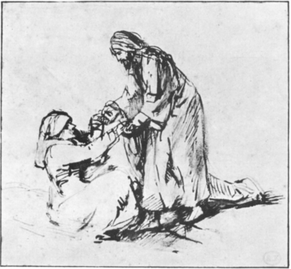 When Lisa and I had moved into our apartment, we were immediately recognized. More typically than not, it seems I can’t walk out my door without hearing, “Hey, Pastor, can I talk to you?” Or, “my friend here needs prayer.” I am immediately confronted with many that are unclean, unbathed, reek of smoke and alcohol; with those who aren’t very coherent; some who spent the night in the park, or the night selling themselves to support drug habits. This isn’t so far from the crowds whom Jesus encountered. I am confronted daily with the difference between the clean and the unclean, literally and socially. Now in Matthew 9:9, Jesus calls the tax-collector Matthew to follow him. Matthew represents half of the problem group of “tax collectors and sinners.” Immediately (v. 11) we hear many of Matthew’s tax collector buddies and sinners came and were reclining [at a supper meal] with Jesus and his disciples. This does not sit well with temple leadership. You have to remember in the social-location at that time, this all would have been very public, with neighbors and “the crowd” and the curious all peering in to the supper venue. Most likely a curious Pharisee was able to get the attention of a few disciples, pulling them out to ask: “Why does your teacher eat with tax collectors and sinners?” (v 11). Jesus overhears the question and takes the opportunity to teach everyone: “Those who are well have no need of a physician, but those who are sick. Go and learn what this means: ‘I desire mercy, and not sacrifice.’ For I came not to call the righteous, but sinners” (vv. 12-13). This begins a thread of accusations from the temple-leadership against Jesus—they don’t like the nature of Jesus’ fishing.The accusation from the Pharisees, “Why does your teacher eat with tax collectors and sinners” is juxtaposed to Jesus explaining his mission, “Those who are well have no need of a physician, but those who are sick.” So, we have those who do not need a physician, meaning the accusing Pharisees and those who are sick, meaning the “tax collectors and sinners.” This is the pattern here in Matthew. Let’s be fair to Matthew. We like to read what Jesus said as “everyone is like a tax collector and we’re all sinners.” No. No. No. Leveling and equalizing this robs us of the narrative impact: I think we can agree Jesus calls Matthew—a real life tax collector—and Matthew invites his friends and entourage to have a meal with Jesus. So here we have the context and the social group meant by “tax collectors and sinners.” Tax-collectors are not only the bottom of everyone’s hate list, they are traitors of the worse kind (Israelites in the employment of Caesar). Sinners are not simply “everyone” (you know because everyone sins—although true, this is not the reference). It is not as if Jesus said, “but those who realize they are sick.” Matthew has been pretty clear that the crowd he has been ministering to and who surrounds Him is made up of all the sick, those afflicted with various diseases and pains . . .(Matthew 4:23-24): these are most assuredly in the narrative the “sinners”: The sick, the mentally unstable, the deceased, the lame. Elsewhere in the gospels, we know that sinners are outsiders (e.g., Galileans), the uneducated, those in sympathy with the Empire, those ignorant of the Law, those outside the insiders of the temple leadership and their friends and families. This is why the Pharisees are offended by Jesus. This is why they do not like the nature of his fishing. Jesus says in the same breath (Matthew 9:13): “Go and learn what this means: ‘I desire mercy, and not sacrifice.’ For I came not to call the righteous, but sinners.”Again, we tend to read this as if Jesus said, “I desire you be saved by grace and not by any works because sacrifices can’t save you.” All good (of course), but misses Jesus’ point.
We are most glad, most thankful that Jesus choses mercy over sacrifice. Looking at the surrounding miracles stories and the summaries in Matthew: Jesus chooses mercy
These are not the things and situations one chooses in that culture and social classing, if one desired to be pure (the goal of the religious elite) or to be perceived as holy (again, the temple-leadership). No. Not at all. We are, however, as fisher-followers, to live out mercy by being in the proximity of the crowd, and thus touching the unclean (literally and socially). This is following Jesus around; and this is doing what Jesus did, here we are made fishers of men, demonstrating that the kingdom of heaven has appeared. *This sermon was preached at Redeemer Presbyterian Church in Concord, MA on Sunday, May 19, 2019. The full sermon maybe downloaded as a PDF (here). An audio version is also be available >> Audio version Part I | Part II | Part III | Part IV
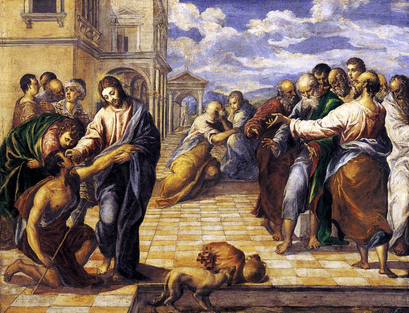 The unpardonable sin? What is this? Have I committed it? If you have, the ball game is over, done, finished. You can never ever be pardoned. Ever. According to both the Matthew 12 and Mark 3 unpardonable sin texts. And, this pastoral nonsense, that is, "well, if you are concerned about it, then you haven't committed blasphemy of the Spirit" is not in these texts as a way around it. Yet, pastors and lay-people/teachers use this "counsel" all the time. It seems the default pastoral answer. (How do pastors know this, anyway?) But, whatever it is, it is serious stuff. So, I believe the better question is, how should we read this "blasphemy of the Spirit" text in Matthew 12? And, what does it mean to the church that reads (in Matthew's Gospel) this rebuttal and warning from Jesus to the accusing temple leadership? This “sin” from Matthew 12 (cf. Mark 3) have been misappropriated so much that it fits the adage, if you keep telling a lie over and over again eventually everyone just thinks it to be true. Although, preachers and teachers might certainly not be lying, they have, however read back into these texts what has “always” been clear since it seems true and has been repeated over and over (so they repeat). Let us, however, look at the logic (the simple grammar and the context) happening in the Matthew 12 “blasphemy against the Holy Spirit” text. The unpardonable sin referenced here has to be related to the previous verse (the one that heads the paragraph, verse 30), for the warning of such blasphemy against the Spirit begins with a “therefore” (v. 31; Διὰ τοῦτο/dia touto, literally “on account of this,” “because of this”). So, the reader must ask, “therefore what?” or “on account of what?” Well, verse 30 is the answer:“He who is not with Me is against Me; and he who does not gather with Me scatters.” So, the “sin and blasphemy” is related to the one who “is not with” Jesus, but is “against” Him. And still, the “is not” and “against” is very specific—it is not a general “anyone who isn’t a Christian” or “any who reject Jesus” (which neither are in the text—yet, we continue to back this understanding in to the text). No. The one who “blasphemies against the Spirit” is the one who scatters and does not gather (based on verse 30). This is a leadership sin, a leadership blasphemy. At least here in this text. It is a rebellion right at the top. For, the terms “gather” and “scatter” are shepherding terms, which are very appropriate to the context Matthew gives to this narrative. Earlier, Jesus is looking upon the marginalized, oppressed, the poor, the bottom demographics and says, “Seeing the people, He felt compassion for them, because they were distressed and dispirited like sheep without a shepherd” (Matthew 9:36). This is what is clear from the text. Blasphemy against the Holy Spirit is related to the absence of shepherds that care/guard/protect the sheep, that is, sheep who are among the “distressed and dispirited” (FYI, this is the meaning of “poor in spirit,” but that for another time). The no shepherd/scattered-lost sheep portrait is pulled from Ezekiel’s prophecy and warnings (how about that, a warning!), and, specifically, Ezekiel 34:5: “So they were scattered, because there was no shepherd . . . My sheep were scattered.” Also, interestingly, Ezekiel portrays the restoration of God’s people and their return to covenant faithfulness as facilitated by the . . . wait for it . . . the Spirit (Ezekiel 36-39); thus, further linking our “blasphemy against the Holy Spirit” in Matthew to Ezekiel’s prophecies and warnings. Thus, we need a reading of this text with the no shepherd/scattered sheep framing in the narrative. Finally, it is important to note that Matthew has already set this all up in narrative. How do people know that Jesus is the promised Messiah: What do they hear and see? blind receive sight lame walk lepers are cleansed deaf hear dead are raised up poor have the gospel preached to them (Matthew 11:4-6). No doubt this is Matthew’s version of Luke’s draw on Isaiah 61, which promises that God’s Spirit (how about that, the Spirit again) would be on the Messiah to preach the gospel to the poor, to heal, free, and bring justice (Isaiah 61:1). This is the context in Matthew. This is exactly what Jesus is doing: He is fulfilling the Isaiah and Ezekiel vision of future redemption. This is what the temple and synagogue leadership miss, ignore, or are fighting against. So the blasphemy of the Spirit–the unpardonable sin–is more closely related to the role of shepherds in relation to sheep, that is, leaders among God's community and the sheep appointed to their care/protection (i.e., in Israel's case, temple-leadership; in our case, church leaders) that do not consider the poor or design (religious or church) systems that marginalize the poor (e.g., unintended consequences or purposeful matters not). In other words, to not do as Jesus did, that is, in having compassion for the despised, distressed, and bottom demographics is to deny that the promised time of redemption has arrived and, thus, is not forgiven—forever! The "sign" of the kingdom of God's arrival was (and I cannot find in the NT anywhere where this has changed) that the gospel was preached to the poor, the oppressed set free, and disabled walk. This is affirmed in Matthew's Gospel. The whole "blasphemy of the Spirit" episode hinged on Jesus casting out demons and healing a deaf mute so he could hear and speak, a sign of God's kingdom and that Jesus is the Spirit-anointed Messiah. Thus, the narrative meaning of the blasphemy of the Spirit, which is clear and can be inferred by a faithful reading of the text and context, is to stand in rebellion against the inauguration of the kingdom of God and to shame (lower the standing) of Jesus. Rejecting (hindering, acknowledging, ignoring) the kingdom's presence signaled by God's concerned for the poor et al. is, well, blasphemous. *I have not spoken to the issue of "honor/shame," which is most certainly an element framing Jesus' hostile encounter with temple-leadership. The scribes and Pharisees are publicly shaming Jesus, calling Him the son of Satan and empowered by Satan to do "these signs." So, in one public shaming Jesus is put down and His miracles were not the true signs of the kingdom of God. This isn't just about call good evil and bad good; this is about wholesale disbelief and rebellion against the inauguration of God's reign–which is why it's unpardonable.
|
AuthorChip M. Anderson, advocate for biblical social action; pastor of an urban church plant in the Hill neighborhood of New Haven, CT; husband, father, author, former Greek & NT professor; and, 19 years involved with social action. Archives
February 2024
Categories
All
|
|||||||||||||||||||||||||||
Pages |
More Pages |
|
 RSS Feed
RSS Feed